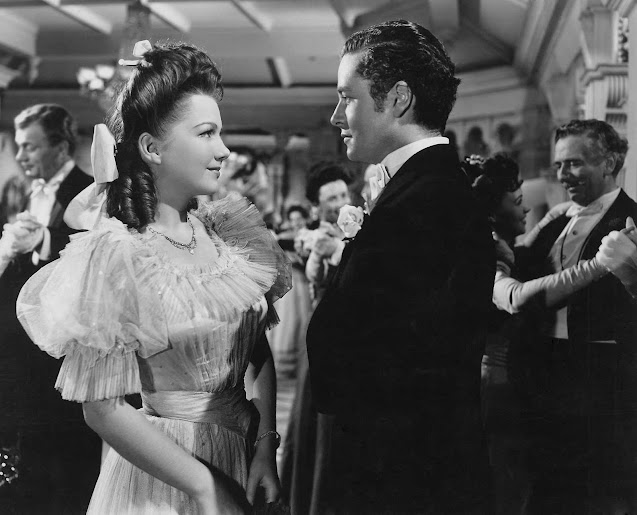The Magnificent Ambersons
1942's THE MAGNIFICENT AMBERSONS is a truncated epic-that-shoulda-been, but is still impressive and vital. It was writer/director/producer Orson Welles' first film after his CITIZEN KANE triumph, and by many accounts what he shot and assembled was as good if not better than his debut. This was originally to be a film over two hours, and the very subject matter, based on a novel of the same name by Booth Tarkington, lends itself to such. A story spanning a few generations, with familial crises and manifests, sown seeds that lead to a selfish character's "come-uppance"? With a running time just under one and one half hours? The reason is echoed among many other Welles' projects - battles with the studio, who of course knew better and gauged audience reactions. More than forty minutes were shorn and ultimately lost. Even Bernard Hermann's score was edited, enough so for him to demand his name be left off the credits.
Sad, all of it, but what remains is still quite good. Never mind that the film resembles a highlight reel rather than the sprawling saga intended. I'm also willing to forgive the film's ending, reshot by the studio (participation by AMBERSON's editor Robert Wise) without Welles. While true to the book, it completely clashes with the tone of every scene previous. The story, set at the turn of the century, is essentially a highbrow melodrama/soap opera, but is so compelling and entertaining that most is forgiven. For me, Welles' direction and Stanley Cortez's astonishing and ahead of its time camerawork really distinguish the picture. The use of shadow and lighting throughout the Amberson mansion is also quite striking. The majesty of the domecile is continually stressed by low angles. This is master class work.
This would additionally include the acting. Joseph Cotten as Eugene Morgan, who has heavily invested in a new technology - the gas powered automobile. Dolores Costello as Isabelle Amberson (later Minafer), who rejected Morgan's hand in marriage because he embarrassed her with an under the bedroom window serenade and accepted that of dullard Wilbur Minafer (Don Dillaway). Anne Baxter as Lucy, Eugene's daughter. Agnes Moorhead as Wilbur's sister Fanny. And Tim Holt as George Amberson Minifer, the bratty only son who proves a hellion in his early years and a prig later on. All are quite good and engage the audience fully in this tragic tale. Welles does not appear onscreen but provides the opening and closing narration in his patented reassuring voice. He even announces the end credits.
One should be grateful for what we have, and it is worthy of any serious film buff's precious time.
Sad, all of it, but what remains is still quite good. Never mind that the film resembles a highlight reel rather than the sprawling saga intended. I'm also willing to forgive the film's ending, reshot by the studio (participation by AMBERSON's editor Robert Wise) without Welles. While true to the book, it completely clashes with the tone of every scene previous. The story, set at the turn of the century, is essentially a highbrow melodrama/soap opera, but is so compelling and entertaining that most is forgiven. For me, Welles' direction and Stanley Cortez's astonishing and ahead of its time camerawork really distinguish the picture. The use of shadow and lighting throughout the Amberson mansion is also quite striking. The majesty of the domecile is continually stressed by low angles. This is master class work.
This would additionally include the acting. Joseph Cotten as Eugene Morgan, who has heavily invested in a new technology - the gas powered automobile. Dolores Costello as Isabelle Amberson (later Minafer), who rejected Morgan's hand in marriage because he embarrassed her with an under the bedroom window serenade and accepted that of dullard Wilbur Minafer (Don Dillaway). Anne Baxter as Lucy, Eugene's daughter. Agnes Moorhead as Wilbur's sister Fanny. And Tim Holt as George Amberson Minifer, the bratty only son who proves a hellion in his early years and a prig later on. All are quite good and engage the audience fully in this tragic tale. Welles does not appear onscreen but provides the opening and closing narration in his patented reassuring voice. He even announces the end credits.
One should be grateful for what we have, and it is worthy of any serious film buff's precious time.



Comments